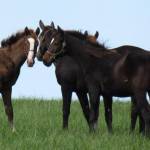Impact of Weaning Stress on Immune Systems of Foals

Weaning involves a lot of stress. A foal is separated from its mother, possibly moved to another pasture or barn, and deprived of the milk it has ingested daily since birth. These emotional, management, and dietary changes often lead to increased vocalization and exercise. Foals may show a depressed appetite, slowed weight gain, increased heart rate, and a rise in cortisol secretion for several days after weaning. It is no surprise that the foal’s immune system takes a hit during weaning.
Research in calves and piglets has shown an increased susceptibility to gastrointestinal and respiratory infections at the time of weaning, but few similar studies have been done with foals. A study conducted at the University of Kentucky looked at the effect of weaning on cell-mediated immunity. Abrupt weaning caused a significant reduction in the production of cytokines, particularly types of interferon that are responsible for fighting pathogens.
Changes in diet at weaning can upset microflora balance in the intestinal tract. This change can allow an overgrowth of pathogenic organisms as well as increasing inflammatory responses. In some animal species, supplementation with yeast (Saccharomyces cerevisiae) before and during the time of weaning has been shown to help restore the gut flora and support proper immune function. Some yeast cell wall components are known to be immunostimulators, signaling T-cells to produce interferon. This practice, along with dietary management to minimize sudden changes in feed at the time of weaning, might decrease disease susceptibility during this stressful period.








